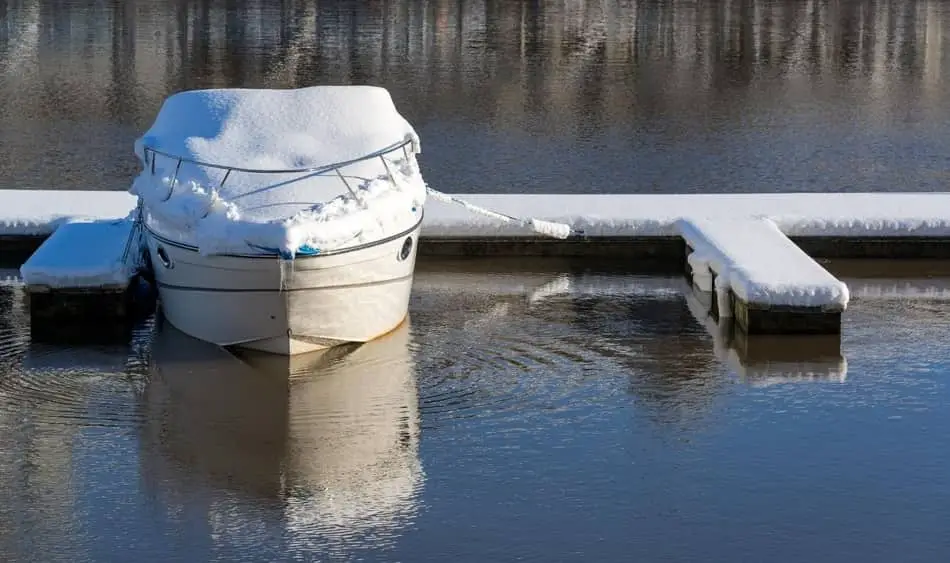Its been a fun boating season, and at the end (season’s end) its time to winterize the boat, and you started wondering whether all the boats need to be winterized or only particular types of boats need to be winterized? So, let’s find out whether all boats need to be winterized or not.
All boats need to be winterized, especially motorized boats. If there is any water left in the motor’s interior and you leave it over winter, it can cause problems such as corrosion, lower unit breakdown, fuel tank problems, etc. For non-motorized boats, proper cleaning and storing is sufficient.
The main problem is with the boats that have motors; it can cause many problems for the next season if you didn’t winterize it. Kayaks and canoes are needed to be appropriately stored during the winter, and that is enough for non-powered boats.
All the motors and the boats need to be cleaned properly and should be winterized. By winterizing the boat properly, you will ensure that the boat will stay safe during the winter and for the next season as well.
It can sometimes take expensive repairs such as outboard motor lower unit failure, corrosion in the fuel tank and in lines, etc. So, it depends on many factors, and it is good to winterize a boat, which can save a ton of money in the future. (see below to know what happens if you didn’t winter the boat)
That being said, it can cause some severe problems if you didn’t winterize a boat, which takes your money and time. Okay, let’s see what happens if you didn’t winterize the boat and the problems it can cause.
Check my article on Winterizing a boat: A detailed guide (opens in a new tab) to properly winterize a boat in a step-by-step process easily and quickly.

What happens if you didn’t winterize the boat?
Here is a list of some common problems you will find if you forget or didn’t winterize the boat.
- Fuel problems
- Battery problems
- Corrosion problems
- Storage problems
Those are the most common problems you will see if you didn’t winterize the boat.
1. Fuel problems
Nowadays, most of the boats are using E10 gas (10% ethanol in gas), which will create water in the tank if you leave it for a long time without stabilizing the gas. The primary cause of water collecting in fuel tanks is condensation from humid air.
Ethanol will make room for water, evaporating the gas (petrol) form the tank. That water in the tank’s bottom can corrode the tank, fuel lines and can cause severe damages to the motor overtime during the winter.
Eventually, the water will corrode the fuel tank and can make holes in the tank, which is an expensive repair. So, stabilizing the gas will prevent all these problems.
Diesel has different risks – algae can grow in it and cause clogged filters and injectors. Dirty filters will get growth and clog. Tanks left almost empty or half full are more prone to biological growth than tanks filled with biocide treated fuel (source).
2. Battery problems
Just turning off the boat will not prevent the battery from draining. You might not be aware of it, but when your boat is turned off, your battery could still draw power from things such as the radio, bilge pump, even a clock, etc.
Marine batteries can still discharge when it’s not in use. Simply leaving them on a boat can drain the battery completely over a span of two or three weeks, and leaving it for months in the winter can damage the battery completely.
So, by removing the battery from the boat will prevent all these problems. And simply removing it from the boat is not the complete solution; you need to clean the battery, terminal posts, and apply lubricant to prevent corrosion.
Finally, after doing all those processes, you need to charge the battery and store it in the basement or in the house on a rubber surface to prevent any battery drain conditions. And for every two or three weeks, you need to recharge them as well.
3. Corrosion problems
Corrosion is one of the biggest problems for a boat and engine. And if the boat is not properly winterized and if there is any water left in the motor or even water droplets are enough to cause corrosion and form rust, which can break the walls of the motor if not treated on time.
If the water is not dried in the water intake lines and the cooling system lines, it can corrode the lines and can form holes in the lines. This is the main problem related to the presence of water in the engine.
To prevent all those problems, you need to use anti-freeze and fogging oil in the engine. All these things will remove the water in the engine interiors and form a layer of protection (lubricant) on the inner walls preventing corrosion during winter.
4. Storage problems
If you are leaving the boat on land rather than in the water, you need not worry much about any storage issues (still, it has problems, but less than the boat left in the water).
The biggest problem with storing the boat in the water is growth on the boat hull. Keeping the boat for a long time in the water (such as during the winter) without cleaning and applying bottom paint on the hull will increase the growth on the hull.
So, if you store the boat in the water for winter storage, you need to do appropriate work to prevent growth on the hull, such as applying the bottom paint on the hull and doing regular checks every 3 or 4 weeks.
Check my article on How long can you leave a boat in the water (opens in a new tab) to know some of the essential things you need to do while storing the boat in the water for a long time.
Do Jet boats need to be winterized?
Jet boats need to be winterized because if there is any water left or trapped in the engine’s interiors, it can cause corrosion and can break the blocks or make a hole in the engine overtime during the winter. Winterizing it will prevent all these things, and I’ll save a ton of money.
Jet boats may cause fewer problems than the boats with a normal motor (although not much) because the outboards are exposed more to the water than a jet boat engine.
Still, both the motors need to be appropriately winterized to avoid any problems. Winterizing a normal boat (boat with I/O or outboard motors) and the jet boat is almost the same except few steps need to be done additionally for a boat with outboard or I/O.
Check my article on Winterizing a jet boat: A detailed guide for newbies (opens in a new tab) to properly winterize the jet boat in a step by step manner easily and quickly.
Do jet skis (PWC) need to be winterized?
Jet skis need to be winterized because if there is any water left or trapped in the engine’s interiors, it can cause corrosion and can break the blocks or make a hole in the engine overtime during the winter. Winterizing it will prevent all these things, and I’ll save a ton of money.
Both Jet skis and jet boats function in a similar way, and both need to be winterized. The jet skis winterizing process is slightly different and can be done quickly compared to the Jetboat and the boat with outboard or I/O motors.
Check my article on Winterizing a jet ski (PWC): A detailed guide for newbies (opens in a new tab) to properly winterize the jet ski (PWC) in a step by step manner easily and quickly. And winterizing a Jetski and Seadoo and Waverunner is similar (slightly).
Do pontoon boats need to be winterized?
Pontoon boats need to be winterized because if there is any water left or trapped in the engine’s interiors, it can cause corrosion and can break the blocks or make a hole in the engine overtime during the winter. Winterizing it will prevent all these things, and I’ll save a ton of money.
Most of the pontoon boats have either an outboard motor or I/O motor attached to the stern, which needs to be winterized to prevent all the common problems (fuel, battery, corrosion, and storage) as discussed above.
Check my article on Winterizing a pontoon boat: A detailed guide for newbies (opens in a new tab) to properly winterize the pontoon boat in a step by step manner easily and quickly.
Bottom line
All powered boats need to be winterized, and you need to prepare the boat properly for long-term storage to avoid any problems. Most of the winterizing process is similar to all types of boats (with slight differences).
So, if you have two or three boats, after winterizing one boat, you will get a clear idea about what has to be done, and you can winterize the rest of the boats or jet skis easily and quickly.
Non-powered boats such as kayaks, canoes, etc. need to be cleaned properly, and that is sufficient for winter storage because they don’t have motors, and they won’t be stored in the water.
So, properly storing the non-powered boat inside the home or at the storage is sufficient for non-motorized boats.
